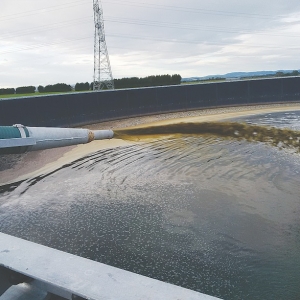But they’ve been warned nutrient content is variable and it may be necessary to top up with fertiliser nitrogen to maintain maize yields.
“Effluent is not fertiliser so plan for that and manage it accordingly,” Plant and Food Research’s Dirk Wallace told the Foundation for Arable Research conference in Palmerston North last week.
That means testing for nutrient content just before application, “not five days before at the pond you’re going to get it from,” stressed Wallace.
The disturbance of ponds or heaps and possible interim storage can cause changes in nutrient content with shifts in the organic-to-inorganic (ie immediately available) nitrogen ratio, and total amount of nutrient due to losses as ammonia to the atmosphere through volatalisation.
For crops a high nitrogen effluent is preferable as it will reduce diesel use in application and compaction risk as fewer passes are required to apply the same amount of nutrient.
“As drymatter increases so does the total nitrogen concentration,” Wallace pointed out.
The problem from the grower’s perspective is when that nitrogen will be available to the crop, as organic nitrogen will be held in the soil until it breaks down.
“The form you want to grow crops is inorganic nitrogen; that’s immediately available,” he says.
Wallace and others are doing greenhouse studies of if and when the organic fraction of nitrogen in effluents becomes available. So far it looks like there’s about a one-month lag.
“At four weeks we found we were still losing nitrogen. Then mineralisation kicks in and we start talking about that organic nitrogen becoming available.”
A problem with the immediately available nitrogen in effluent – the inorganic part – is retaining as much as possible for the crop and minimising losses to atmosphere.
Field trials with maize grown after effluent applications found anything more than a nine-day delay between application and sowing cut yield.
“So put it on and get it in and it will help you to grow the crop.”
Incorporation into soil, ideally by injection, also reduces losses to the atmosphere. However, liquid effluents tend to have lower nitrogen content so high-rate applications can saturate soils causing problems with subsequent field work and sowing.
“Discing wet soil is rubbish for soil structural qualities,” noted Wallace.
Across six field trials it was found 20-50% of the nitrogen applied in effluent was recovered by maize crops, with yield off effluent averaging 14.0t/ha compared to 13.3t/ha off conventional fertilisers.
However, the recovery rate of nitrogen could pose a problem in some regions if councils cap total nitrogen applied to, say, 200kgN/ha/year, because in practice only 40-100kg of the effluent N is available in that growing season, Wallace warned.
Use of dairy effluent in cropping systems could be an environmental win-win, reducing leaching losses from dairying while cutting synthetic fertiliser use in arable systems.
“60% of [greenhouse gas] emissions from the arable industry are related to synthetic fertilisers,” noted Wallace. That high figure is largely due to high energy use in the manufacture of urea or ammonium nitrate.
















